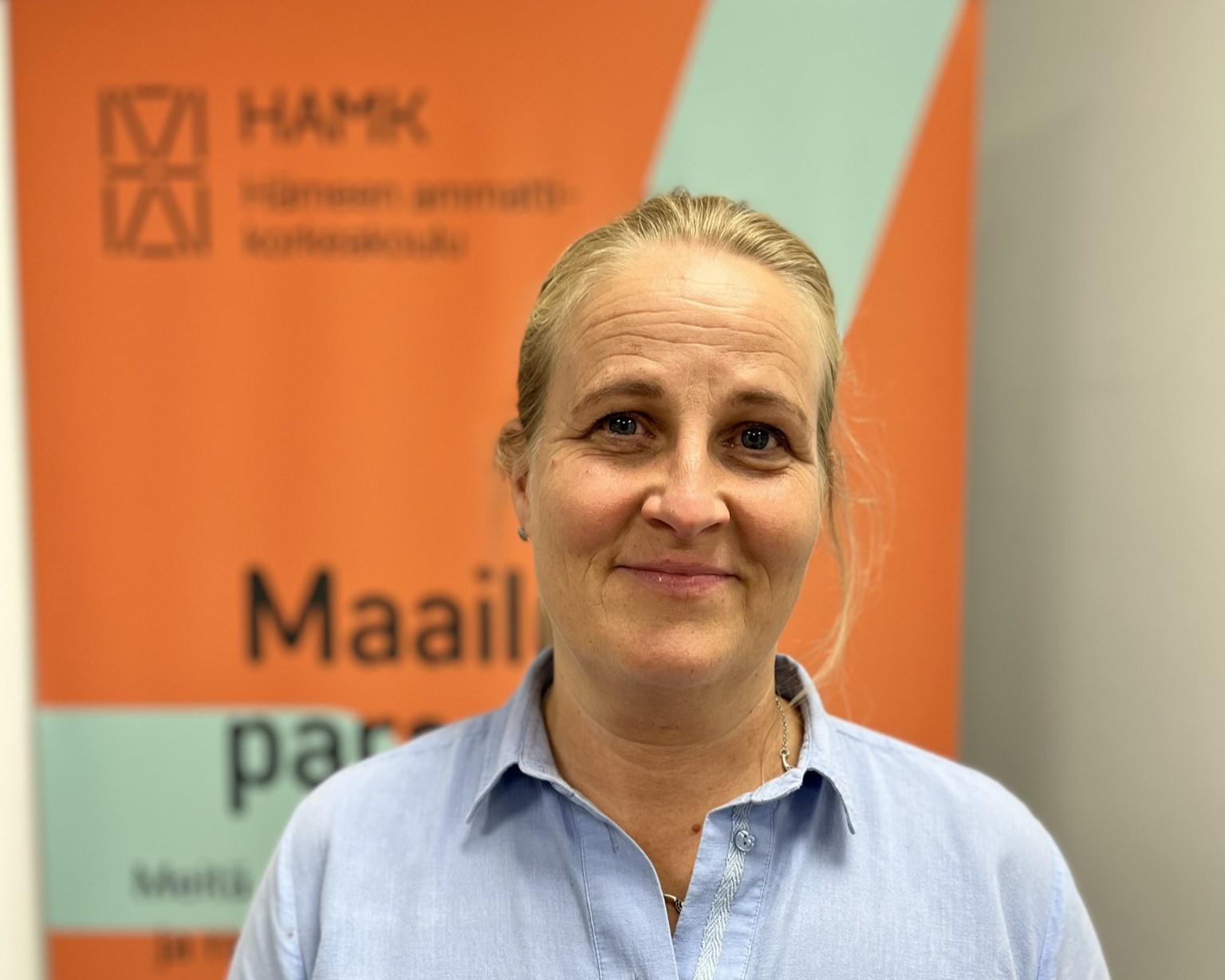Annukka Pakarinen, Research Director

Annukka Pakarinen, HAMK’s Research Director, steers the overall research activities of HAMK. She also heads the Bio Research Unit and is heavily involved in the RUN European University, promoting research and funding at that level as well.
Research puts the idea of bettermaking into practice in many ways. One of them, according to Pakarinen, is that HAMK wants to stay at the forefront and play an active role in its collaborative networks to move things forward. Together with companies, we are looking for things that can feed into business and into people’s everyday lives.
“A very concrete issue is the development of more sustainable food production. In Mustiala and Lepaa, a lot of research is being done on new types of growing media or carbon sequestration, or developing digital tools to help understand natural processes. In addition, we are beginning to have the level of expertise in synthetic biology that we can develop applications in this area as well,” Pakarinen illustrates.
A very concrete issue is the development of more sustainable food production.
On a personal level, Annukka finds her inner bettermaker in trying to enable the in-house experts to work as well as possible. Another important thing is to ensure that research funding is used responsibly for things that matter.
“Overall, the research profiles and areas we have chosen are all interesting and relevant, both on a large and small scale.”
Research profiles are at the heart of relevance
HAMK’s research focus is on biotechnology/bioeconomy, sustainable built environment and future education and skills, all with the “smart” tag. This means that everything we do takes into account the possibilities of digitalisation and technology.
The strategy is to do only those things where HAMK can be among the best in the world.
“In many respects, there is still a long way to go, but it is a good guideline for our day-to-day work to ensure that our efforts are properly targeted. Therefore, within the quite broadly named research areas, we are making even more precise delimitations so that we can really achieve the best,” says Pakarinen.
Supporting the green transition is a big framework for all activities.
“In the construction sector, for example, we have focused a lot on different coatings and paints and ways to improve energy efficiency, or in the bioeconomy on understanding the whole value chain and, for example, recovering nutrients from different types of waste.”
So why are these topics important in the first place?
“Simply because the planet can’t support us all at this rate, so new things need to be developed. I think the issues we have profiled are very relevant in this respect. Of course, education and skills development are also extremely important, so that we continue to have people who can put knowledge into practice and develop it further.We are particularly proud that we have such a strong focus on the areas we are working on.”
HAMK has clear strengths in research
In general, Pakarinen says, research at HAMK is in a good, growing state. The number of research staff has increased every year, and now totals just over a hundred. In addition, there has been a determined effort to profile research priorities and to increase cooperation across departments.
“We are gradually getting the hang of multidisciplinarity, for example, when we talk about the natural resources sector, what does digitalisation mean there? We are also bringing research related to the competence and education of the School of Professional Teacher Education to a wide range of fields,” Pakarinen says, adding:
“Of course, we are behind many big players, but that is also a positive thing, because in this really fast-changing world we are able to make the necessary choices and specialise.”
Pakarinen admits that in terms of research funding, development could always be faster, but even here, HAMK has made progress in relation to its size: “We have increased the amount of external funding and made new openings, such as funding for increased activities in Africa or funding from the Academy of Finland and Business Finland.
According to Pakarinen, this positive development is explained by long-term work and the fact that HAMK has, of course, been involved in RDI activities from the very beginning.
“I must also mention the great team spirit and the fact that the message has reached a wider region that we are serious about what we do here.”
Sustainability issues are on the agenda of many, and HAMK is not the only one in the world doing anything about it. According to Pakarinen, however, HAMK’s strength lies in its in-depth expertise, especially in the natural resources sector – after all, the Mustiala, Evo and Lepaa campuses were the first in Finland to teach this field. The networks are extensive and the facilities unique. Equally special is the research into skills and education, which play an important role in a changing world.
“Bringing intelligence and digitalisation to these areas is a strong differentiator for us.”
The Bettermakers
At HAMK, we believe that the world can be saved with both feet on the ground. All it takes are brave people and concrete actions.
We are a team of approximately 10 000 people shaping the future of bioeconomy, health, education, business, design and technology. Our presence spans across seven campuses, online, and internationally.